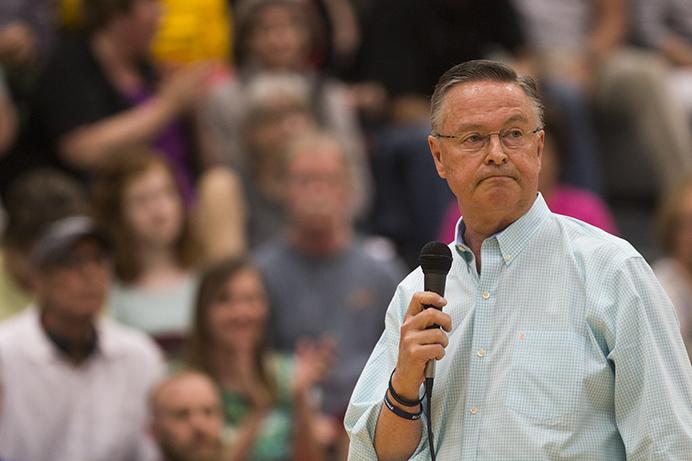Rosario: U.S. Rep. Rod Blum lambasts Iowa reporters
Rep. Rod Blum’s criticism of local media reflects President Trump’s hostility toward the press.
U.S. Rep. Rod Blum, R-Iowa, speaks during an event in Johnson Hall on the Kirkwood main campus in Cedar Rapids on Tuesday, May, 9, 2017.
September 9, 2018
In recent weeks, Rep. Rod Blum, R-Iowa, has made his disdain for the press abundantly clear — and even targeted individual reporters.
On Aug. 29, Blum claimed KCRG-TV reporter Josh Scheinblum’s questions had ignored that Blum’s opponent, Rep. Abby Finkenauer, D-Dubuque, raised more out-of-state funds than he did in the race for Iowa’s 1st Congressional District.
“Waiting for the news story on KCRG. #MediaBias,” he tweeted.
KCRG did, in fact, report that Finkenauer’s campaign money is “predominately coming from out of state.”
Days later, Associated Press reporter Ryan Foley emailed Blum’s staff about why he was in a racist Facebook group called “Tea Party.”
Blum tweeted a screenshot of the email that included the reporter’s office address and cellphone number. He denied knowledge of the Facebook group.
“This ‘journalist’ is obsessed w hating on Republicans & abuses his position,” he tweeted.
Replies to the original tweet criticized Blum for “doxing” the reporter by posting Foley’s contact information. Blum deleted that tweet and reposted it on Sept. 2, with Foley’s information redacted.
On Sept. 4, a U.S. House Ethics Committee announced it would investigate the Iowa congressman for failing to disclose his involvement in a digital-marketing company. Blum released a statement including media criticism.
“Still, the complicit media continues to take its cues from the Democratic Party, and they work to make mountains out of molehills,” he said.
Make no mistake — this rhetoric is dangerous for American democracy, and it comes directly from the highest office in the land. President Donald Trump’s criticism of the media is often directed toward national organizations such as CNN, the Washington Post, and the New York Times. But worse than that, the president has extended his press vilification to all journalists, whom he has labeled “really bad people,” “downright dishonest,” and “dangerous and sick.”
Make no mistake — this rhetoric is dangerous for American democracy, and it comes directly from the highest office in the land.
The pervading generalization is that journalists are fundamentally without character. Therefore, no journalist who tries to hold power accountable is safe from being called “fake news” — not an AP correspondent from Iowa or even a local TV news reporter.
This distrust is so potent that politicians automatically assume bias. They spread false information that an organization hasn’t written a story on their opponent, when they have, indeed, written such stories. Politicians conclude a reporter is “obsessed w hating on Republicans” just because they asked a question. And they push the narrative that a bipartisan investigation is a collaboration between Democrats and unconscionable journalists — sound familiar?
A year ago, I wrote a column about how the liberal slant in media is a real, measurable problem. That remains true. The media industry has dramatically shifted since 2008, with more journalists working in coastally concentrated internet publishing than regional newspapers. And in general, newsrooms are not very diverse — along, racial, gender, or political lines. A 2013 survey by Indiana University researchers found that while half of journalists identified as politically independent, just 7 percent identified as Republicans.
That being said, most newsrooms share a strong commitment to fairly informing the public. To speak as though they don’t has real consequences. A recent Gallup Poll found that Americans estimate more than one-third of the news they see is inaccurate. The internet giving rise to (actual) fake news is partially to blame. But it’s not unreasonable to say that attacks on journalists have exacerbated skepticism.
This idea that the press is the “enemy of the American people” is not bolstered to stop the spread of lies but to withhold the truth. If politicians are implicitly instructing their constituents to turn against state and local journalism, voters stand to be uninformed about issues that most directly affect them.
No story has been made truer by a reporter not asking a question.
Disclosure: Associated Press reporter Ryan Foley is a former Daily Iowan editor-in-chief and serves on the Student Publications Board.














